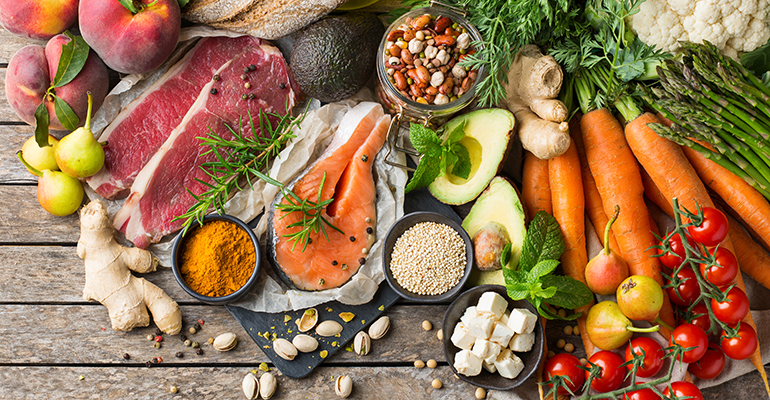News
New Nordic nutrition guidelines emphasise plant-based eating
11 Jul 2023
Nordic scientists and experts are now recommending that people should consume less meat and more plants for both their health and the health of the planet.
The Nordic Council of Ministers has recently updated the Nordic Nutrition Recommendations (NNR) for the first time since 2015. It advises that food consumption should not affect the environment and climate unnecessarily.

The guidelines suggest that the average diet should include lots of vegetables, fruits, berries, legumes, potatoes, whole grains, nuts and seeds, and more fish from sustainably managed fish stocks. It additionally should include less meat, alcohol, and foods high in salt, sugar and fat.
Intertwining personal and planetary health
Since 1980, the NNR has recommended what nutrients the body needs from different food groups, but it is now expanding to take environmental aspects into account.
The guidelines “have served as reference texts internationally and have guided the design and development of national food based dietary guidelines in the Nordic and Baltic countries,” said Karen Ellemann, the secretary general of the Nordic Council of Ministers.
“These guidelines influence the nutrition labels that in turn inform consumer food choices. They also guide school meals and the food we serve in our hospitals and other care facilities.”
Research for the 2023 report prioritised topics like protein intake in children, legume consumption in adults, quality of dietary fats, intake of vitamin B12 and consumption of red meat, and how these eating behaviours impact things like risk of obesity, cardiovascular disease and dementia.
“A significant proportion of the population in the Nordic and Baltic countries are at risk of developing chronic diseases or have already been diagnosed with a chronic disease,” the authors of the report said, which can be positively or negatively affected by a person’s eating habits.
In this edition of the report, the authors concluded that what is good for human health is also good for the earth’s climate.
“Beyond affecting our personal health, our food choices also have long lasting impact on our climate and environment,” Ellemann said.
“The decision to let this edition integrate environmental aspects is well aligned with our global commitments, and with the Nordic Vision to be the most sustainable and integrated region by 2030. We cannot, and will not, turn a blind eye to the scientific evidence of how our consumption impacts our planet.”
 © AdobeStock/Andrey Armyagov
© AdobeStock/Andrey Armyagov
Bridging nutrition guidelines between countries
Thirty-six different nutrients, including carbohydrates, protein, vitamin D, and iron, and 15 food groups, including beverages, red meat, dairy, and alcohol, were studied for the 2023 report.
The guidelines advise that for health reasons, consumption of red meat should not exceed 350 grams per week, and consumption of processed red meat should be as low as possible. However, for environmental reasons, they advise that the consumption of red meat should be considerably lower than 350 grams per week.
Eating more legumes is good for the environment, the report said, because they have among the lowest relative climate impacts in comparison to all types of meat.
In addition to the dietary recommendations, the 2023 report discussed the need for better “international harmonization and collaboration between national authorities.”
“Such global harmonization is possible since foods and nutrients have identical health effects across nations and regions.”
Most nations still develop their own diet recommendations for citizens without collaboration from other countries. The US, for example, updates its Dietary Guidelines for Americans every five years, which “provides advice on what to eat and drink to meet nutrient needs, promote health, and prevent disease.”
The most recent 2020-2025 edition does not go as far as the NNR in recommending a plant-based diet, less red meat or prioritising environmental health. The US guidelines focus on less sugar, fat, sodium and alcohol, and still recommends that citizens customise their diets with “nutrient-dense food and beverage choices to reflect personal preferences, cultural traditions, and budgetary considerations.”
Related news

Soy story: WWF scores UK supermarkets on sustainability efforts
12 Nov 2025
WWF has published its latest “Soy Scorecard”, ranking UK supermarkets’ efforts to combat deforestation and land conversion in their soy supply chains.
Read more
Standing Ovation and Bel scale up casein production from dairy co-products
11 Nov 2025
Foodtech company Standing Ovation has partnered with cheese specialist Bel Group to manufacture dairy serums for industrial-scale casein production via precision fermentation.
Read more
New UPF standard hoped to offer consumers ‘coherence and clarity’
10 Nov 2025
Ingredients companies are being urged to enter “a new era of partnership and innovation” following the launch of the industry’s first non-UPF verification scheme.
Read more
Whistleblowers accuse UK meat industry of promoting cheap, unsustainable supply
7 Nov 2025
An anonymous group of industry insiders has accused the UK’s biggest food companies of systematically driving down meat quality and welfare standards.
Read more
Bord Bia presents Irish dairy ingredient suppliers at Fi Europe
6 Nov 2025
Dairygold Co-operative Society, The Carbery Group, and Ornua Co-operative: Meet with sustainable producers of Irish dairy ingredients at Food ingredients Europe 2025, Hall 7.2 Stand M18.
Read more
AI attraction means foodtech startups must ‘prove’ rather than ‘promise’
4 Nov 2025
Reports suggest that artificial intelligence (AI) is sucking investment from foodtech and agritech, but investors say the picture is complicated.
Read more
Penguin and Club bars no longer classed as chocolate
30 Oct 2025
Penguin and Club bars can no longer be classified as chocolate after the pladis-owned McVitie’s brands turned to cheaper alternatives amid the ongoing cocoa crisis.
Read more
Could plant-based protection replace plastic packaging?
29 Oct 2025
Swedish foodtech company Saveggy has launched an additive-free plant-based protection for cucumbers, offering a waste-free packaging solution for fruit and vegetables.
Read more
Does promoting protein content push up plant-based sales?
27 Oct 2025
Promoting the protein content of meat-free products is a more effective sales strategy than adding carbon labels, a study of UK bakery chain Greggs suggests.
Read more
Amazon Grocery launch aims to balance quality with affordability
22 Oct 2025
Global e-commerce giant Amazon has introduced a new private-label food brand, combining existing Amazon Fresh and Happy Belly products with new everyday items.
Read more